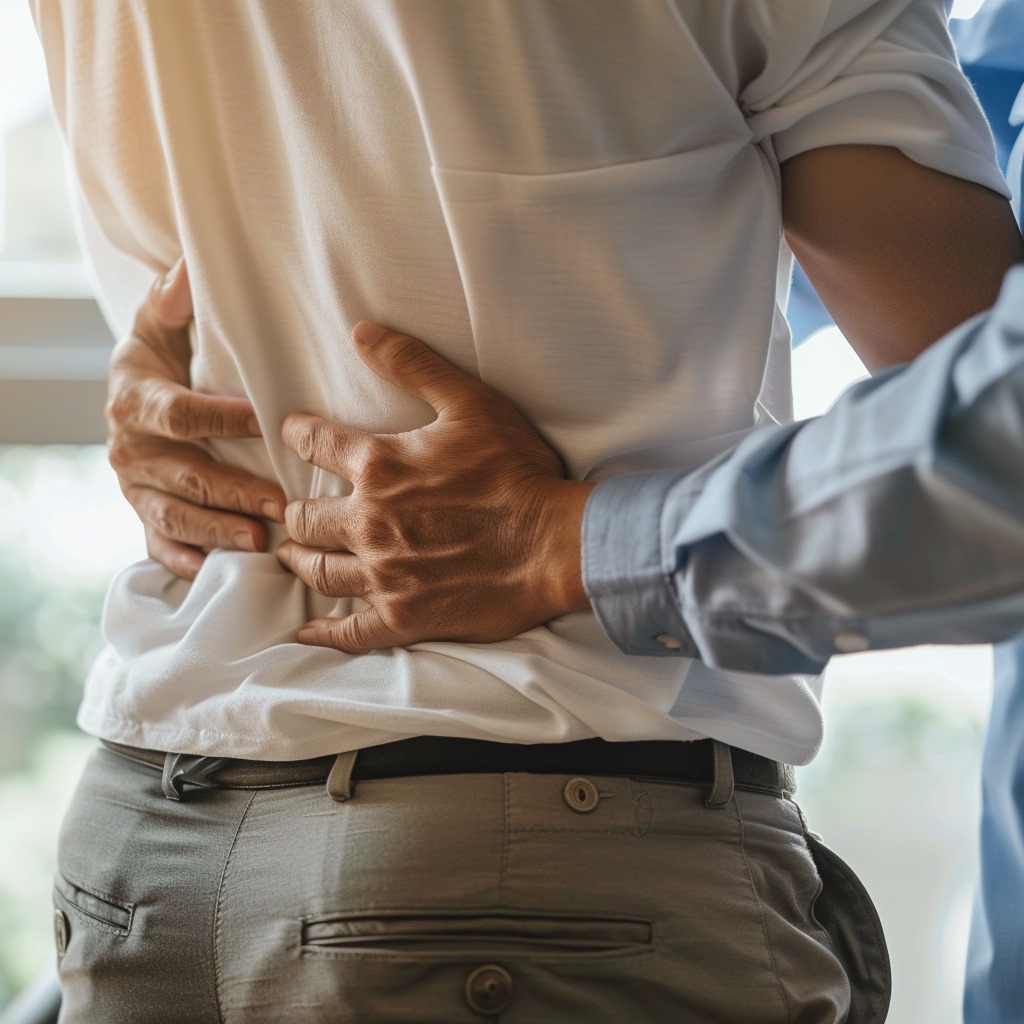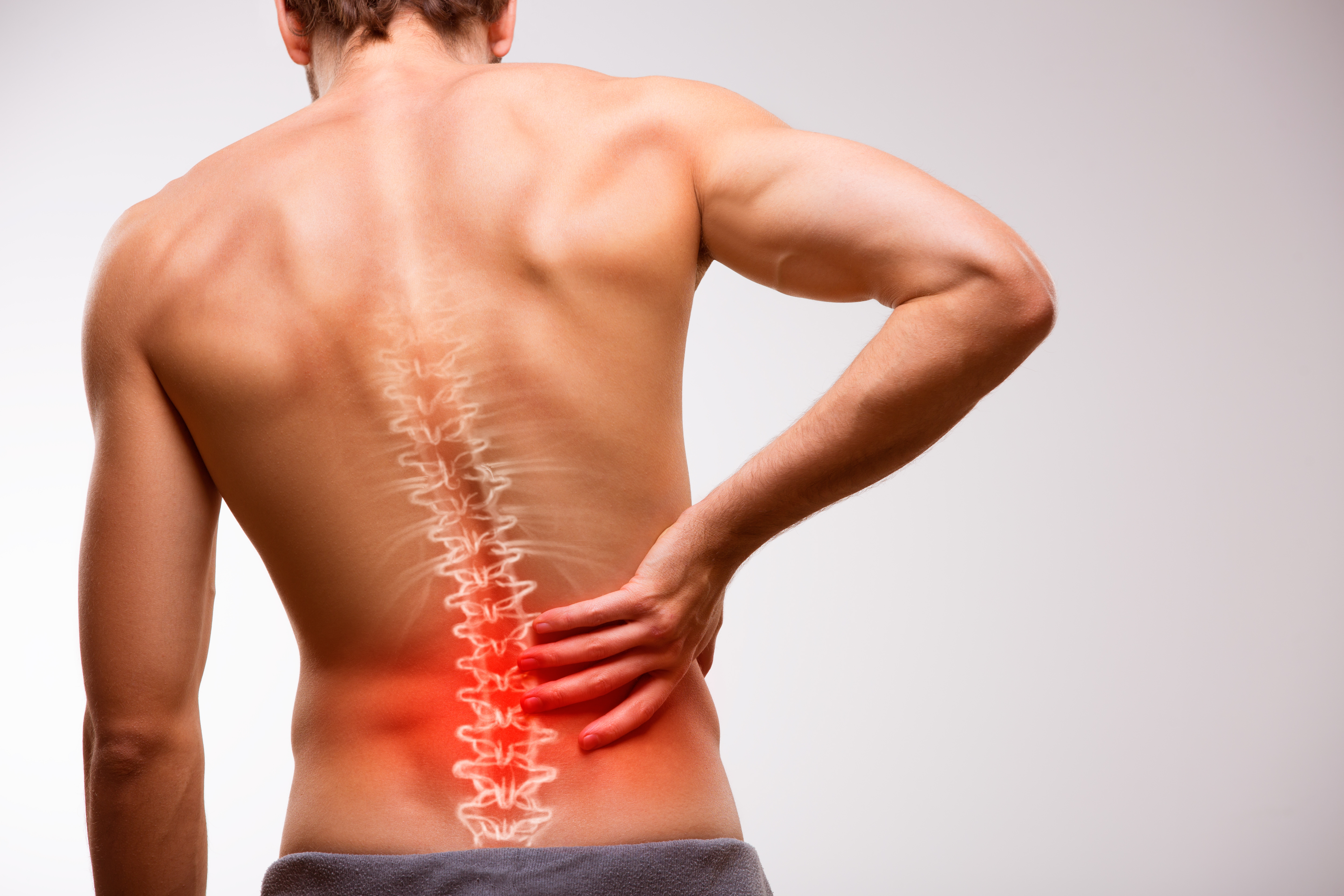Lower Back Pain

Lower back pain is a prevalent problem that affects millions of people worldwide. Its impact can be debilitating, hindering daily activities and affecting overall quality of life. It can manifest in various forms, from sudden and severe episodes that render movement difficult, to persistent discomfort when lying down or sleeping. Tightness in the lower back, particularly when waking up or squatting, is a common complaint, sometimes accompanied by a noticeable bump or swelling in the affected area.
When your lower back hurts, it can happen suddenly or slowly over time. This pain might feel like a persistent ache or sometimes be more intense. Some people also notice the pain when they move in certain ways or feel stiff after sitting for a while. It's important to know that most of the time, this kind of back pain gets better on its own within about a month.
Lower back pain may also be accompanied by abdominal discomfort, with symptoms such as diarrhea exacerbating the situation. In females, various factors, including hormonal changes and reproductive health issues, can contribute to lower back pain.
Sometimes the backaches manifest in various forms, each presenting its own set of challenges and discomforts. Some common types are described below:
- Sudden Onset Pain: Occurs abruptly, often as a result of injury or overexertion.
- Chronic Pain: Persists for an extended period, sometimes becoming a recurring issue.
- Sciatica: Characterized by pain radiating down the sciatic nerve, often extending into the legs.
- Muscular Strain: Caused by overuse or improper lifting techniques, leading to muscle spasms and discomfort.
- Degenerative Disc Disease: Results from wear and tear on the spinal discs, causing stiffness and pain.
- Herniated Disc: Occurs when the soft inner material of a spinal disc protrudes, pressing on nearby nerves and causing pain.

Doctors are not exactly sure why lower back pain happens, but they think it might be because the muscles, ligaments, and bones in your lower back are not working together quite right.
Some things can make it more likely for you to have lower back pain, like carrying extra weight, feeling stressed, or doing hard physical work. See the list below to see all possible factors that could worsen or lead to lower back pain. Keep in mind that more than one factor may be involved:
- Prolonged stress
- Extended periods of driving
- Engaging in physically demanding work
- Frequent heavy lifting
- Excessive twisting or bending of the back
Recognizing these contributing factors on time helps you to make necessary lifestyle adjustments and minimize the risk of developing or exacerbating lower back pain. While the causes may vary, adopting preventive measures and a healthy lifestyle can significantly contribute to reducing the incidence and severity of lower back pain. In the case of the following urgent symptoms described on the next page, contact your GP or emergengcy services with urgency.

Dealing with lower back pain requires a multifaceted approach. Utilizing supportive pillows for sleeping can alleviate discomfort, while exercises to strengthen the core muscles and maintain flexibility can help prevent future episodes. Some individuals find relief through the use of inversion tables, but it's essential to ensure proper technique and supervision.
In conclusion, addressing lower back pain involves a combination of lifestyle modifications, targeted exercises, and sometimes medical interventions. By understanding the causes and employing effective management strategies, individuals can mitigate the impact of this common ailment on their daily lives.
With lower back pain, self-management strategies play an important role in recovery. Here, we share some details about what you can do about your lower back pain:
- Consistent movement is important: Keep your body moving and active, ensuring (sudden) severe lower back pain doesn't catch you off guard, and avoid staying in one position for too long to promote healing and flexibility.
- Avoiding prolonged periods of inactivity: Steer clear of sitting or lying down for extended periods, preventing tight lower back discomfort and stiffness; movement helps maintain flexibility.
- Start doing exercises that stretch and strengthen the back muscles: Engage in gentle exercises that both loosen and strengthen your back muscles, aiding in the management of lower back pain.
- Maintain good posture, especially while sitting: Sit up straight and avoid slouching to reduce the strain on your lower back, preventing discomfort when lying down.
- Lift objects properly: Bend your knees and lift with your legs, not your back, to prevent sudden lower back pain and unnecessary strain.
- Pay attention to ergonomics in your workplace: Arrange your workspace to support a natural and comfortable posture, reducing the risk of back pain when waking up or squatting.
In most cases, a visit to the doctor is not immediately necessary, and over-the-counter pain relievers like paracetamol may offer relief. The list below shows when its advised to use MIA or create a doctor appointment
- You have back pain after a fall: The pain persists beyond a month or worsens.
- You have had surgery or an injection in your back in the last 2 weeks: If your neck hurts or feels stiff when you try to bend it. Try to bend, and notice if your chin touches your chest without pain or limitation
- You have or have had cancer: If you notice small red spots on the skin which do not fade when you press on them.
- The symptoms have not improved after one month: If you're throwing up a lot and it's not stopping, especially if you have a headache.
It is necessary to immediately contact emergency services or the out-of-hours GP service if you experience one or more of these symptoms:
- Sudden onset of severe lower back pain: accompanied by dizziness, sweating and an urge to faint.
- Inability to urinate or retain urine: despite the urge, suggesting possible urinary retention.
- Loss of control over bowel movements: known as fecal incontinence, which may indicate nerve compression.
- Numbness or loss of sensation in the genital area: and anus (saddle anesthesia), indicating possible nerve compression.
- Sudden weakness in the legs: making it difficult to stand on toes or heels, which may signify nerve compression.
- Persistent lower back pain following recent surgery: trauma, or diagnosis of cancer.